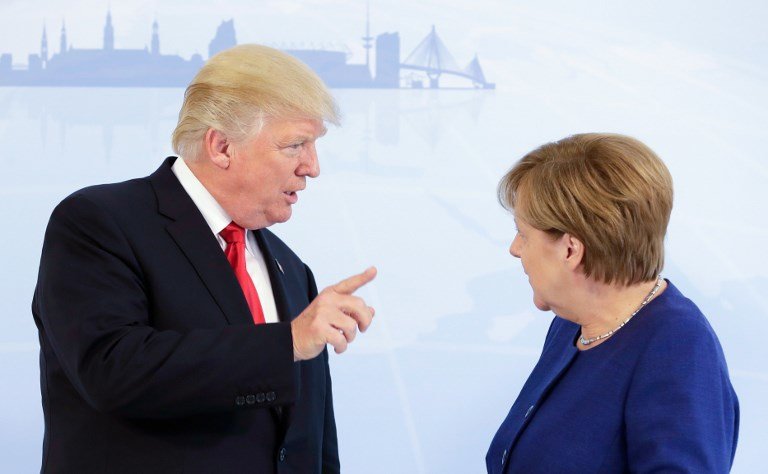Berlin and Washington consult over the JCPOA

TEHRAN - "Angela Merkel", Chancellor of Germany, is to travel to the United States and visit Donald Trump, the controversial President of the U.S. The visit takes place at a time when the economic disputes between Washington and the United States have reached its pick because of the U.S. government announcement of imposing tariffs on the imported steel and aluminum. Furthermore, Merkel intends to negotiate with Trump trying to convince him to remain as part of the Joint Comprehensive Plan of Action (JCPOA).
The deal was reached in 2015 among Iran, the five permanent members of the U.N. Security Council (China, France, Russia, United Kingdom and United States) plus Germany and the European Union. This is while Trump had announced the U.S. withdrawal from the nuclear deal by May 12. According to some news sources in Germany, Merkel's visit will take place on (April 27th). However, the German Foreign Ministry has refused to confirm this news.
In any case and regardless of the exact time of this visit, it will definitely take place before the end of April, sinceTrump has threatened to pull out of the agreement unless his European allies help “fix” the agreement with a follow-up accord. It should be noted that the Western media are trying to introduce this visit as an attempt by the German chancellor for saving the JCPOA, and have refused to address other disagreements currently raised between America and Europe.But the fact is that the European officials are stuck in a complicated position.
If Washington reinstates sanctions on Iran, European firms operating there will be hit with Washington-imposed fines, severely hurting a major part of their global revenues. On the other hand, Iranian Foreign Minister "Mohammad Javad Zarif", responded on Twitter that the deal was not renegotiable and that Trump’s stance “amounts to desperate attempts to undermine a solid multilateral agreement.”
Last September, the Bloomberg reported that in the sidelines of the United Nations General Assembly in New York, there was a controversy between Germany and the two other European countries (Britain and France) about how to deal with the nuclear accord. Accordingly, Paris and London were trying to convince Berlin on "the necessity for reforming the nuclear deal." However, Germany has recently taken a different approach from its two European partners over limiting the missile power and putting regional sanctions against Iran.
During a recent European Council meeting in Brussels, the European troika, in a united position, sought to convince other EU member states on the need for limiting Iran's missile power and imposing regional sanctions against Iran.The European troika has argued that the sanctions are necessary to keep the JCPOA going.
However, some European countries, including Italy, Spain and Austria, opposed this argument and have declared that there is no guarantee that Trump will remain as part of the nuclear deal even with the EU's sanctions against Iran. In this case, the European Union's credibility will be put under question by its new sanctions against Iran.This is while the Iranian authorities has formerly emphasized that our country's nuclear program is only for peaceful purposes and that Tehran will stick to the accord as long as the other signatories respect it.
In any case, Merkel may ask Trump to put off his decision on imposing nuclear sanctions on Iran once again, providing EU with more time to come to an agreement over this issue. However, it is quite possible that Trump and Macron are going to simultaneously discuss other approaches and strategies to confront Iran.
As emphasized, the type of cooperation between the French President and the German Chancellor, and the issues that the two intend to discuss on their visit to the United States, will enormously affect the U.S. and the EU's decision on how to deal with the nuclear accord. The German Chancellor is deeply worried to be a victim of Trump and Macron's bargain over the JCPOA.This is what has happened before in 2017.
At that time, Trump first made a deal with the French on a change in the content of the JCPOA, forcing German authorities to cooperate with him in this way. Can this experience be repeated during the separate visits of Merkel and Macron with?
Leave a Comment